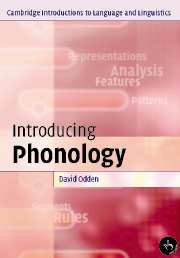Book contents
- Frontmatter
- Contents
- About this book
- Acknowledgments
- A note on languages
- List of abbreviations
- 1 What is phonology?
- 2 Phonetic transcriptions
- 3 Allophonic relations
- 4 Underlying representations
- 5 Interacting processes
- 6 Feature theory
- 7 Doing an analysis
- 8 Phonological typology and naturalness
- 9 Abstractness and psychological reality
- 10 Nonlinear representations
- Glossary
- References
- Index of languages
- General Index
9 - Abstractness and psychological reality
Published online by Cambridge University Press: 05 June 2012
- Frontmatter
- Contents
- About this book
- Acknowledgments
- A note on languages
- List of abbreviations
- 1 What is phonology?
- 2 Phonetic transcriptions
- 3 Allophonic relations
- 4 Underlying representations
- 5 Interacting processes
- 6 Feature theory
- 7 Doing an analysis
- 8 Phonological typology and naturalness
- 9 Abstractness and psychological reality
- 10 Nonlinear representations
- Glossary
- References
- Index of languages
- General Index
Summary
KEY TERMS
abstract
absolute neutralization
psychological reality
external evidence
PREVIEW
This chapter explores the extent to which underlying and surface forms can be different – what constraints if any are tenable within the formal theory, what the issues are in limiting abstractness, and how to address these questions empirically. The central question raised in this chapter is “what counts as evidence for a phonological analysis?”
A fundamental question in the theory of phonology has been “how abstract is phonology?”, specifically, how different can the underlying and phonetic forms of a word be? The essential question is whether grammars use entities that are not directly observed. Related to this is the question of whether a linguistic model requiring elements that cannot be directly observed reflects what the human mind does. The very concept of a mental representation of speech, such as a phonological surface form like [sᴐks] socks which is not itself an observable physical event, requires abstracting away from many specifics of speech. Without generalizing beyond the directly observable, it would be impossible to make even the most mundane observations about any language. The question is therefore not whether phonology is abstract at all, but rather what degree of abstractness is required.
If underlying representations are fully concrete – if they are the same as surface representations – the underlying forms of English [khɔrts] courts and [khowdz] codes would be /khɔrt-s/ and /khowd-z/.
- Type
- Chapter
- Information
- Introducing Phonology , pp. 257 - 300Publisher: Cambridge University PressPrint publication year: 2005



